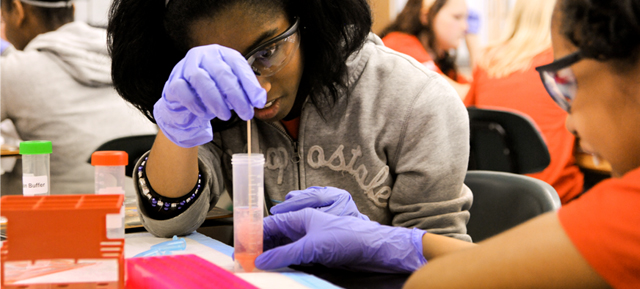Modifying Your Own Genes Is Just An Injection Away–If You’re Feeling Lucky
By Adele Peters,
Fast Company
| 10. 10. 2017
“What we’ve got here is some DNA, and this is a syringe,” Josiah Zayner tells a room full of synthetic biologists and other researchers. He fills the needle and plunges it into his skin. “This will modify my muscle genes and give me bigger muscles.”
Zayner, a biohacker–basically meaning he experiments with biology in a DIY lab rather than a traditional one–was giving a talk called “A Step-by-Step Guide to Genetically Modifying Yourself With CRISPR” at the SynBioBeta conference in San Francisco, where other presentations featured academics in suits and the young CEOs of typical biotech startups. Unlike the others, he started his workshop by handing out shots of scotch and a booklet explaining the basics of DIY genome engineering.
If you want to genetically modify yourself, it turns out, it’s not necessarily complicated. As he offered samples in small baggies to the crowd, Zayner explained that it took him about five minutes to make the DNA that he brought to the presentation. The vial held Cas9, an enzyme that snips DNA at a particular location targeted by guide RNA...
Related Articles
By Scott Solomon, The MIT Press Reader | 02.12.2026
Chris Mason is a man in a hurry.
“Sometimes walking from the subway to the lab takes too long, so I’ll start running,” he told me over breakfast at a bistro near his home in Brooklyn on a crisp...
By Zachary Brennan, Endpoints News | 02.23.2026
The FDA is spelling out the details of a new pathway to help speed personalized cell and gene therapies to market for rare diseases.
Monday’s long-awaited draft guidance outlines the agency’s “plausible mechanism” framework, a pathway FDA Commissioner Marty Makary...
By Amy Feldman, Forbes | 02.17.2026
"Jennifer Doudna" by Duncan Hull for the Royal Society via Wikimedia Commons licensed under CC by SA 3.0
Soon after KJ Muldoon was born in August 2024, he was lethargic and wouldn’t eat. His worried doctors realized his ammonia...
By David Jensen, California Stem Cell Report | 02.10.2026
Touchy issues involving accusations that California’s $12 billion gene and stem cell research agency is pushing aside “good science” in favor of new priorities and preferences will be aired again in late March at a public meeting in Sacramento.
The...




